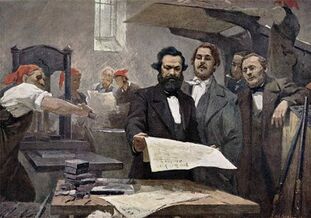Exploitation
In Marxist theory, exploitation is the appropriation of the labor product of one class by another. Exploitation is fundamental to the nature of classes and therefore of class society, arising from the prehistoric division of labor made possible from the creation of an economic surplus; however, the details of this process are debated both within mainstream anthropology and among Marxists. Since exploiter and exploited both have an interest in increasing their share of the produce, and assuming a state of scarcity, their interests are irreconcilable, and they are said to be in contradiction.
Membership in an exploiting class is often associated with political power, and this relationship can flow both ways: for example, capitalists in a liberal democracy routinely use their positions to secure political influence, whereas well-connected party members in the Eastern Bloc emerged from the capitalist restorations as owners of newly private means of production. In ancient Roman society, the Senators were the great slaveowners; in feudal society, kings were often beholden to their lords; in bourgeois society, the capitalists rule supreme. Thus exploitation is the common thread of political struggles throughout history.
Origin
David Graeber and David Wengrow's The Dawn of Everything and Paul Cockshott's How the World Works are two works which touch on the topic of exploitation and its origins in prehistory.
Feudalism
The concept of exploitation is most easily understood by looking at the feudal example. Serfs were obligated to give a portion of their produce to their lord and to the church, which would be distributed among unproductive classes like knights, monks, and priests, and household servants. This would include grain but also cattle and various other material goods the lord required - including, infrequently, weapons and armor. The peasants were thus exploited because they were forced to sacrifice their time and energy in order to support others. The serfs could also be compelled to labor directly, a practice known to historians as corvée labor.
Development
The Carolingian Empire is considered to be the earliest and best example of pure feudal society.
Capitalism
Marx argued that capitalist profit originated in the disparity between the resources necessary to sustain a worker and the resources they can produce. This gap presents itself as a difference between the wage necessary to sustain the worker, and the value added during the production process, which seems to appear from thin air. With every increase in efficiency, the gap between subsistence income and total value grows, increasing the rate of exploitation; however, through industrial actions such as strikes, the working class can increase their share of the product and even decrease the exploitation rate. This conflict between profit-seeking and industrial action is the main form which class struggle takes in capitalist society.
And this is the economic constitution of our entire modern society: the working class alone produces all values. For value is only another expression for labour, that expression, namely, by which is designated, in our capitalist society of today, the amount of socially necessary labour embodied in a particular commodity. But, these values produced by the workers do not belong to the workers. They belong to the owners of the raw materials, machines, tools, and money, which enable them to buy the labour-power of the working class. Hence, the working class gets back only a part of the entire mass of products produced by it. And, as we have just seen, the other portion, which the capitalist class retains, and which it has to share, at most, only with the landlord class, is increasing with every new discovery and invention, while the share which falls to the working class (per capita) rises but little and very slowly, or not at all, and under certain conditions it may even fall.
— Friedrich Engels, Introduction to Wage Labor and Capital
